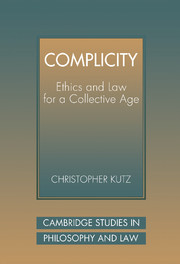Book contents
- Frontmatter
- Contents
- Acknowledgments
- 1 Introduction
- 2 The Deep Structure of Individual Accountability
- 3 Acting Together
- 4 Moral Accountability and Collective Action
- 5 Complicitous Accountability
- 6 Problematic Accountability: Facilitation, Unstructured Collective Harm, and Organizational Dysfunction
- 7 Complicity, Conspiracy, and Shareholder Liability
- 8 Conclusion: Accountability and the Possibility of Community
- Notes
- Bibliography
- Index
5 - Complicitous Accountability
Published online by Cambridge University Press: 18 March 2010
- Frontmatter
- Contents
- Acknowledgments
- 1 Introduction
- 2 The Deep Structure of Individual Accountability
- 3 Acting Together
- 4 Moral Accountability and Collective Action
- 5 Complicitous Accountability
- 6 Problematic Accountability: Facilitation, Unstructured Collective Harm, and Organizational Dysfunction
- 7 Complicity, Conspiracy, and Shareholder Liability
- 8 Conclusion: Accountability and the Possibility of Community
- Notes
- Bibliography
- Index
Summary
INTRODUCTION
In the last chapter, I described all of the participants in the Dresden bombing as implicated in the firestorm's rage. Because the collective act of firebombing is ascribable to each individual bomber, the collective act is an object of individual accountability. A participatory intention thus satisfies what we might call the “threshold condition” of accountability: an agent who participates intentionally in a wrong is accountable in some form for that wrong. Moral philosophers have often been content to rest at this threshold condition. But the chief argument of Chapter 2 was that it is a mistake to ignore the particularities of the responses of accountability, their dependence upon the specific relations and positions of agents, victims, and onlookers. How, for example, do we assess the accountability of agents who participate in wrongs, but who do not know which others are also participating? I now want to amplify my claim that individual participation in collective action means individual responsibility for collective harm. I want to show how it can be squared with the variety of circumstances in which we find ourselves as participants in the collective structures of everyday life. In particular, I will explore the positionality of accountability in collective wrongdoing by probing the moral difference between direct action and complicit participation, that is between exclusive and inclusive accountability. I also take up the problem of complicitous accountability in cases of ignorant or psychologically compartmentalized participation, when agents fail or refuse to see the systemic contribution of their actions to collective harms.
- Type
- Chapter
- Information
- ComplicityEthics and Law for a Collective Age, pp. 146 - 165Publisher: Cambridge University PressPrint publication year: 2000

